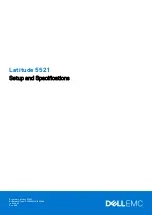
10
Advanced Settings
175
Reassembly Timeout
The
number
of
seconds
after
the
previous
fragment
in
which
no
further
fragments
arrive
before
a
reassembly
attempt
will
be
interrupted.
Device:/>
set
Settings
FragSettings
ReassTimeout=65
Default:
65
Max Reassembly Time Limit
The
number
of
seconds
after
the
first
received
fragment
arrived
before
a
reassembly
attempt
will
always
be
interrupted.
Device:/>
set
Settings
FragSettings
ReassTimeLimit=90
Default:
90
Reassembly Done Linger Limit
The
number
of
seconds
after
a
packet
has
been
reassembled
that
the
SEG
is
able
to
remember
reassembly.
This
prevents
additional
fragments
of
that
packet
from
arriving,
for
example,
old
duplicate
fragments.
Device:/>
set
Settings
FragSettings
ReassDoneLinger=20
Default:
20
Reassembly Illegal Linger Limit
The
number
of
seconds
the
SEG
is
able
to
remember
that
a
whole
packet
has
been
marked
as
illegal.
This
prevents
additional
fragments
of
that
packet
from
arriving.
Device:/>
set
Settings
FragSettings
ReassIllegalLinger=60
Default:
60
Reject Minimal Fragment
Sends
an
ICMP
parameter
problem
message
when
the
non
‐
last
fragment
is
smaller
than
the
minimum
allowed
length,
which
is
specified
by
IPv6MinNonFinalFragment
.
Device:/>
set
Settings
FragSettings
RejectMinimalFrag=No
Default:
No
IPv6 Minimum Non-final Fragment
The
minimum
allowed
length
of
non
‐
last
IPv6
fragments.
Device:/>
set
Settings
FragSettings
IPv6MinNonFinalFragment=640
Default:
640
















































